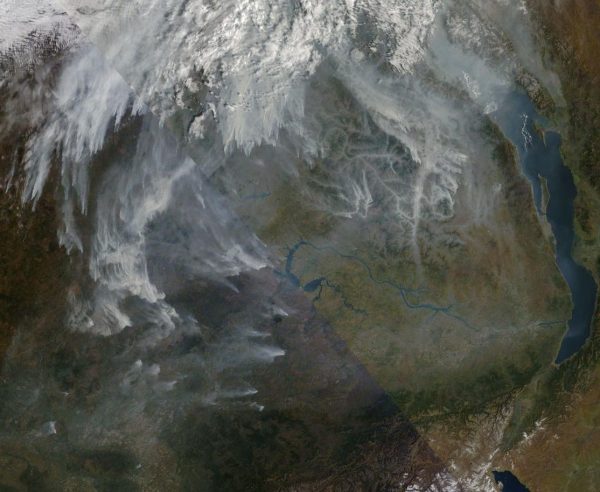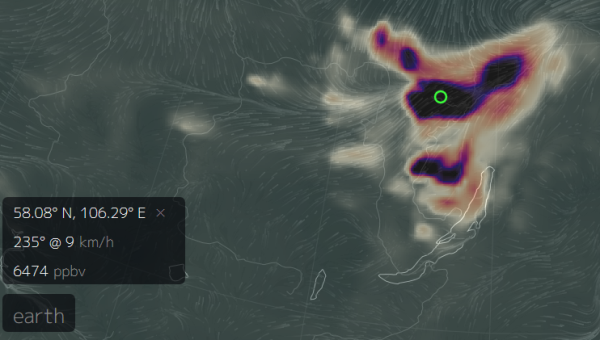Als gevolg van de opwarming van de aarde zien we steeds heviger wordende orkanen, overstromingen, droogtes en dus ook bosbranden.
In Siberië zijn er de (ongeveer) laatste tien jaar steeds meer bosbranden, daar de temperaturen uiteraard ook daar zijn gestegen en bossen uitdrogen. Bosbranden die zo groot zijn, dat ze niet meer te bestrijden zijn....... Uiteraard levert dat ook weer meer CO2 en andere troep af in de atmosfeer, troep die de klimaatverandering nog verder versnellen.....
Daarover gesproken: ook in Siberië en andere arctische gebieden, ontdooit de permafrost, waardoor nog meer CO2 vrijkomt, naast enorme hoeveelheden methaangas, zo ongeveer het sterkste broeikasgas op aarde.......
De bewoners van Bratsk (bij het Baikalmeer) in Siberië verzuchten, dat ze letterlijk stikken in de rook, van de bosbranden.....
Lullig dat in het artikel weer met de vinger wordt gewezen naar Putin als schuldige voor het verbranden van fossiele brandstoffen, terwijl Rusland nog steeds niet kan tippen aan de uitstoot geproduceerd in de VS...... Ach ja, de westerse politiek en de afhankelijke reguliere westerse media stellen Rusland en dan m.n. Putin intussen verantwoordelijk, voor zo ongeveer alles wat er op onze kleine aardbol misgaat......
Huge Fires In Siberia
“We are Suffocating from Smoke” — For Russia, Climate Change is Already Producing Fires that are Too Big to Fight
“For
one month we are suffocating from the smoke. The weather is hot, and
there is a strong smell of burning…” — Residents
of Bratsk, northwest of Lake Baikal, in
a petition to Vladimir Putin pleading
him to fight the fires now raging there.
Let’s
take a snapshot of the current moment from the climate change
perspective: This year, global temperatures will probably hit between
1.2 and 1.25 degrees Celsius hotter than 1880s averages. This new
heat, in a range likely not seen for 115,000 years, is catapulting us
into dangerous new climate states. We’re starting to see the hard
changes happen. Weather is growing more extreme, wildfires are
worsening, the seas are rising, the glaciers are melting, and ocean
health is declining. Threats of destabilization and disruption are
ramping up. But compared to what we will see in the future if the
world continues to warm, if we continue to burn fossil fuels, the
seemingly rough changes we are experiencing now are minor and easy to
manage.
These
are the early, easy outliers of human-forced climate change. But for
some, even for a nation as powerful as Russia, certain events have
already overwhelmed emergency response capabilities.

(Fire
season should have ended by late August around the region of Lake
Baikal in Russia. However, due to climate change-related influences,
massive fires continue to burn through September. The above image is
from today, September 28. Bottom edge of frame represents
approximately 600 miles. Lake Baikal is visible in the right side of
frame. Smoke from large fires currently covering approximately 2.5
million acres is visible throughout the shot. Image source: LANCE
MODIS.)
Climate
Change Spikes Fire Incidence in Siberia
Over the past decade or so, a rapid warming of Siberia has resulted in a dramatic increase in fire incidence. The vast boreal forests were thrust into hotter, dryer conditions by a human-forced warming of the globe. Meanwhile, permafrost thaw added its own massive and growing volumes of peat-like fuel for burning. As the years progressed, very large fires have erupted with rising frequency. Mostly underreported, according to Greenpeace and independent satellite analysis by experts, these fires have covered millions of acres year after year after year:
“If you look at the whole area over the past 30 years, there’s a significant increase in burned area that is very clear by the early 2000s,” Susan Conrad, a former U.S. Forest Service scientist who has spent decades researching the impact of fire on Siberia, told ClimateWire.
Often,
fighting such fires has required the effort of thousands of emergency
responders supported by hundreds of pieces of equipment. As a result,
the growing size of these fires and the lengthening of the season in
which they burn has put a strain on the coffers of an already
cash-strapped Russia. Firefighting has thus been cut or set aside for
instances when a city, town or vital piece of infrastructure requires
defending. More and more, these great fires have been abandoned to
burn on, uncontrolled.
2016
Lake Baikal Fires Too Dangerous to Fight
This
year around the region of Lake Baikal, an unrelenting (climate
change-related) drought combined with abnormal heat to produce
massive fires. The fires raged and flared throughout the summer. As
the typical wildfire season came to an end during late August, the
fires continued to burn and spread. According to Greenpeace, the
fires burning during September in this region alone covered nearly 5
million acres.
That’s an area about the size of Massachusetts. Satellite shots of
the massive fires were dramatic, revealing plumes of dense smoke
spewing out over hundreds or even thousands of miles. Residents of
cities and towns around Lake Baikal experienced terrible conditions
due to a suffocating pall of dense smoke covering the area.
Despite
the risk to public health and increasing cases where
schools, communities and infrastructure were threatened by the fires,
the Russian Emergencies Ministry has claimed that such large fires
are increasingly uncontrollable. Spokespeople with the agency note
that the fires are so intense that they present a danger to
firefighting personnel. According to Radio
Free Europe:
Aleksandr Bruykhanov, senior researcher at the Forestry Institute in Krasnoyarsk, told the Siberian Times that massive wildfires have become more frequent and cannot be fully controlled by the government. He said they will only be extinguished when rain returns to the region. …”The Emergencies Ministry won’t be able to help here but will only cause some extra work for foresters, who will have to rescue rescuers.” [emphasis added]
For
One Month We are Suffocating From Smoke
Hundreds
of firefighters have been deployed throughout the region in isolated
efforts to stem the more eminent blazes. Near the city of Bratsk, 600
firefighters and about 123 pieces of heavy equipment were
reported to be engaged with the fires on September 23.
Unfortunately the firefighting has, thus far, been mostly
unsuccessful.

(High
carbon monoxide readings north and west of Lake Baikal, Russia on
September 28. This expansive plume of carbon monoxide is coming from
very large fires burning in the region. Residents in a nearby city
recently complained of carbon monoxide poisoning in a petition to
Vladimir Putin to fight the fires. Emergencies Ministry spokespersons
have claimed that the fires are increasingly uncontainable and that
the best hope for stopping the fires is when rains return to the
area. Image source: Earth
Nullschool.)
Failure to control the massive burning has resulted in abysmal air quality for the region. In some cases, life-threatening conditions have been reported, with adults and children hospitalized. In Bratsk, a city of 250,000 people, thousands of residents are complaining of stifling smoke and incidents of carbon monoxide poisoning. A heavy pall of dense smoke has hung over the city for more than a month. The conditions there are so bad that 3,000 people have signed a petition to Vladimir Putin, urging him to deploy more resources to fight the fires, and stating that:
"For one month we are suffocating from the smoke. The weather is hot, and there is a strong smell of burning and smoke. It is not possible to open windows, we cannot go out because we soon feel dizziness… Some adults and children are in hospital with severe carbon monoxide poisoning. We are for clean air! We want to breathe. We have that right. Do not remain indifferent to our health and our future!"
Signs
of Exhaustion at the Start of a Rough Climate Future
Exhaustion
of emergency response resources is one of the big threats posed by
climate change. In instances where entire regions see extreme weather
conditions that are far outside the norm for an extended period of
time, such as as severe droughts, floods, and fires, instances of
exhaustion are more likely to occur. Exhaustion also occurs when
events appear that are too large or intense to manage. It appears
that firefighting efforts in Russia are starting to show some signs
of exhaustion. Not good, especially considering the fact that these
conditions are tame compared to what will happen in future years
without some very serious climate change mitigation and response
efforts now.
Whether
they realize it or not, the residents of Bratsk are living at the
start of a much rougher climate future. And they are just now
starting to see a hint of bad conditions that will get worse as the
world continues to warm and Siberia becomes one of the places to see
the worst of it. It’s a situation caused by the very fossil-fuel
burning that Putin currently promotes. This crisis of warming will
cause more forests to burn, the fires to continue to enlarge, and the
peat-like permafrost to become a fuel as it thaws.
The
only way to stop this trend is to halt global temperature rise. That
requires a very heavy lift, an international effort on a scale which
the world has not yet fully committed to — an effort that would
result in the fossil fuels Putin seeks to exploit being left in the
ground in favor of far more benevolent energy sources.
Links:
Hat
tip to mlparrish
Hat
tip to Colorado Bob
Zie ook:
'Niet eerder getoonde satellietfoto's laten zien dat grote delen van Arctisch gebied in brand staan >> klimaatkantelpunt gepasseerd' (zie ook de links in dat bericht)
'Grote Arctische gebieden in Siberië, Groenland, Canada en Alaska branden: klimaatkantelpunt nadert met rasse schreden'
Voor meer berichten n.a.v. het bovenstaande, klik op één van de labels, die u onder dit bericht terug kan vinden, dit geldt niet voor de labels: CO (koolmonoxide) en Baikalmeer.
'Niet eerder getoonde satellietfoto's laten zien dat grote delen van Arctisch gebied in brand staan >> klimaatkantelpunt gepasseerd' (zie ook de links in dat bericht)
'Grote Arctische gebieden in Siberië, Groenland, Canada en Alaska branden: klimaatkantelpunt nadert met rasse schreden'
Voor meer berichten n.a.v. het bovenstaande, klik op één van de labels, die u onder dit bericht terug kan vinden, dit geldt niet voor de labels: CO (koolmonoxide) en Baikalmeer.
